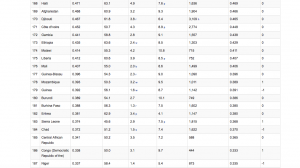Haiti has been my ‘first love’ in terms of global health, so it’s only natural to me to try and compare it with Malawi. Throughout my internship so far, there have been many times when I start a sentence with “Well, in Haiti…” And in my defense, for every time that I’ve drawn a comparison, there are three other times when I could have done so, but kept my mouth shut. After all, I definitely value my time in Malawi as a unique learning opportunity and a chance to fall for another part of the world.
Nonetheless, the similarities have been uncanny; the differences, even more striking.
So, I just can’t help myself. I’m going to share some comparisons of my experiences and views of Malawi and Haiti (each in more or less detail, depending on how self-explanatory it is). Keep in mind that these are my sweeping generalizations, and should be recognized as such. The lines that I’m drawing are hardly as clear as I may make them out to be, and both cultures are far more complex than I can hope to capture in a few thousand characters.
Similarities:
Public transport: Malawian Minibus=Haitian Tap Tap. The main differences are aesthetic-Tap Taps are brightly adorned pick up trucks, often with speakers blaring kompa out the back, while Minibuses resemble 15 passenger vans in the States. Both, however, will be packed with 20+ people, chickens, crops, and other cargo, and both will allow passengers to get from pretty much anywhere in the country on a modest budget.
Colonialism: Malawi was part of the British Empire, while Haiti was under French control. Nonetheless, the influences that these outside cultures have made appear like a little kid’s fingerprints: subtle, but smudged over pretty much everything.
An azungu in Malawi= a blan in Haiti. Both are terms for foreigners or outsiders, with the Haitian term in particular implying Caucasian heritage. I’ve heard ‘azungu’ a fair amount, especially at village events (like the football game this afternoon) and in the market. Not all that shocking that I get labeled this way, considering that I’m the WASPiest thing since Wonderbread.
Religion: Religion seems to play a pivotal role in the life of most Haitians and Malawians. Again, my perspective may be skewed by the fact that I’m currently working at a Catholic mission hospital, and that I worked with mainly faith-based groups in Haiti. Nonetheless, I think that all you need to do is take a glance around to start understanding the role of faith in people’s lives. In Malawi, women sport chichenges festooned with patterns for their local dioceses or evangelism conference. Rosaries stay around people’s necks during exams, and people in both places name their businesses in a way that acknowledges God’s role in their success. In many places, it’s less than a stone’s throw between churches, and Sunday services are a capital E Event that requires the majority of the town to turn up in their finest. People are eager to turn inward and pray in times of trouble, and frequently focus on evangelism (questions about my religious beliefs frequently become a matter of conversation with casual acquaintances or hospital staff). However, ‘ancient’ or ‘tribal’ religions also play a large role. For example, there’s a joke about Haiti being ‘90% Catholic, 90% voodou” that’s not too far from the truth. Many patients we’ve seen at St. Gabe’s run into trouble because they’ve come in days after their chief complaint first manifested. They try the local healer first, only turning to biomedicine after traditional methods fail. Similarly, hougan (voodou priest) practices often run counter to the way a hospital doctor would treat a patient. Treating a pregnant women with turtle blood may not be conventional, and not nearly as effective (read: NOT effective) at preventing HIV vertical transmission as ART. However, in the minds of the patient, the old ways may be even better, adding a layer of complexity to treatment in both Malawi and Haiti.
Malaria, malnutrition, HIV, STIs, and much more. Diseases of poverty run rampant in both places, which makes sense if you look for each country on the Human Development Index (1).

Music! Kompa and Rara are the soundtrack of Karneval, beach trips, pub nights, and even tap tap rides in Haiti, while Malawian urban music plays alongside Nigerian imports from cell phone radios to massive speakers. Although these are still wildly different styles, both feature heavy drums laying down a beat that just won’t quit. I also appreciate the diversity of music in Malawi and Haiti: topics range from the typical American party song (bragging about partying and girls) to protest music against government corruption, to uplifting ditties about changing the future through unity (very “We are the World”). So I guess when I say that music is ‘similar’ in both places, I really mean that I like it better than whitewashed American pop. It’s certainly better to dance to!
Note: So I got too excited (surprised?) and verbose (even less surprising…), so I’ve decided to break this post up and spare you the novella. Stay tuned for Part II with the differences (and oh goodness, there are many!)
(1). Human Development Index (which is a very interesting metric, by the way): http://hdr.undp.org/en/content/table-1-human-development-index-and-its-components